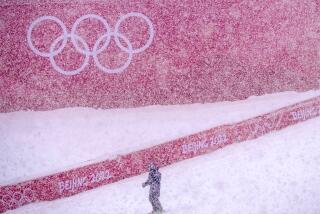Herminator Back in Winner’s Circle
HAKUBA, Japan — A monster crash couldn’t stop “Das Monster.”
Hermann Maier, his body bruised and his right knee strained in a horrible crash three days earlier, careened down the hill with his usual abandon to win the gold medal in the men’s super-G, a race he has yet to lose this season.
Maier didn’t think he was his normally overpowering self. Anyone who watched him emerge from the fog at the top of the course and sail down the course Monday would disagree.
“I was not really the ‘Herminator’ today,” he said, “but I am overjoyed to win this gold a few days after a terrific spill in the downhill.”
Maier, whose injuries in the men’s downhill Friday kept him out of the combined event, showed no loss of his trademark aggressiveness in a race delayed for 45 minutes by fog.
“I never expected this today,” he said. “I’m so happy and I thank my doctors and my trainers.”
The Austrian known as “Das Monster” and the “Herminator” by fans in his home country won in 1 minute, 34.82 seconds, more than a half-second faster than his nearest competition.
“He skied like a master,” said fellow Austrian Andreas Schifferer. “He really is amazing for his performance after he crashed and everything.”
Fellow Austrian Hans Knauss and Didier Cuche of Switzerland shared the silver medal at 1:35.43. No bronze was awarded. It was the third time an Olympic Alpine race had ended with a tie for a silver.
In 1964 at Innsbruck, Jean Saubert of the United States and Christine Goitschel of France tied for the silver in the giant slalom in 1:53.11.
In 1992 at Albertville, also in the giant slalom, Diann Roffe of the United States and Anita Wachter of Austria tied for the silver in 2:13.71.
Cuche, starting far back in the No. 17 spot, thrust his hands into the air in elation at his best finish ever in a super-G. He had been no better than seventh in the four races this season.
Alessandro Fattori of Italy, even farther back with a No. 24 start out of 46 racers, was fourth, .18 seconds behind the silver medalists.
Kjetil Andre Aamodt of Norway, the gold medalist in the super-G in 1992 and bronze medalist in 1994, was fifth, missing a medal by .24 seconds.
Daron Rahlves of Truckee, Calif., was the top American, finishing eighth, 1.14 seconds behind Maier.
“I just let it all hang out and gave it my best shot today,” he said. “I had a fun ride.”
Tommy Moe of Jackson, Wyo., who won a silver medal in the super-G and a gold in the downhill four years ago, was ninth, .01 second behind Rahlves. Kyle Rasmussen of Angels Camp, Calif., was 13th, 1.70 seconds slower than the winner. Chad Fleisher of Vail, Colo., was 34th in 1:40.19.
The race, already postponed twice over the weekend by rain and fog, was the first of an unprecedented Olympic Alpine tripleheader as organizers attempted to get the weather-plagued competition back on schedule.
Far from outwardly tense in his first race after his terrible crash, Maier joked with competitors at the top of the hill as the racers waited out the fog. But inside, he said later, he was concerned.
“After a big crash, it’s hard for the brain, hard to concentrate,” he said. “I needed the first gates to get in my rhythm.”
His race was typical for him, his skis often sailing off the slope in sheer speed as he skied to the brink of losing control.
Before his crash, Maier was the prohibitive favorite in the super-G as well as the downhill and the yet-to-be-run giant slalom.
He had won all four super-G races in this, his first full World Cup season.
More to Read
Go beyond the scoreboard
Get the latest on L.A.'s teams in the daily Sports Report newsletter.
You may occasionally receive promotional content from the Los Angeles Times.






